|
Capetown
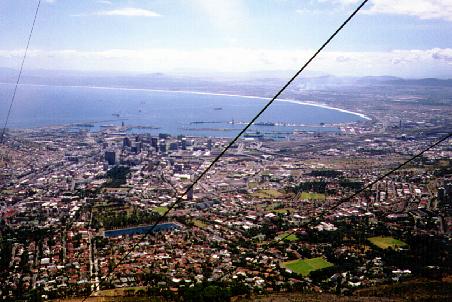
Capetown
İ2001-2002: Bernard Cloutier
|
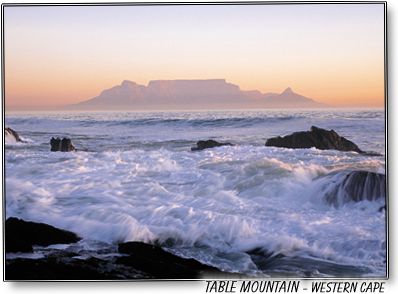
Table Mountain
İ2001-2002: Tourist Office
|
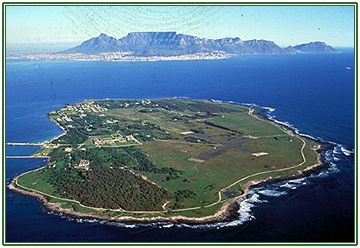
Robben Island
İ2001-2002: Tourist Office
|
|
|
Capetown is the legislative capital of South Africa. It was previously known as Kaapstad, and has a reputation for being one of the most beautiful cities in the world. It lies on the shores of the Atlantic Ocean and has some excellent beaches. However, the water is quite cold as it comes from the south. The city is dominated by another natural feature; the Table Mountain. It is 1000m high and if offers walks to the summit from where visitors can get a marvelous view of the city. Its population includes whites, black Africans, people of Indian origin and others. Among the blacks, there are two major groups, namely Nguni (Zulu, Swazi and Xhosa) and Sotho (Tswana, Pedi and Basutho). Traditional beliefs are the most commonly practised religion among the blacks. There are 11 official languages, but most people speak English and/or Afrikaans. Afrikaans has developed from High Dutch of the 17th century, which has abandoned the complicated grammar and adopted vocabulary from French, English, indigenous Africa and even Asian languages. The Africans speak mainly isiXhosa and isiZulu. Among industries in the city and nearby areas, ship repair is the most important industry. Cape Town possesses one of the world's largest dry docks. Other industries in and around the city include food processing, wine making, manufacture of clothing, plastic, leather goods, petroleum refining, chemical and fertilizer processing, cement and automobiles. Tourism is also gradually becoming more and more important.
|
Johannesburg:
|
Jo'burg (short for Johannesburg) is also known as the City of Gold. Johannesburg is the largest city in South Africa. It
is situated at an altitude ranging from 1,740m-1800m (5,700-5,900 feet). It was founded in 1886 after gold was discovered
in the region. For almost a century, Johannesburg remained the focal point of South Africa's gold-mining industry. Until
apartheid was outlawed in 1991, the population of the city was divided according to color. Non-white groups were allowed
to reside only in certain parts of the city; Soweto, developed as a big urban area for black Africans, while Indians were
restricted to the township of Lenasia. For the people of Jo'burg, one word fits it all: vibrant. Vibrant in their outfit.
Vibrant are their driving habits. Vibrant is the way they hit the dance floor on week end. Vibrant in their hospitality,
their availability to the foreigner. The city is a mix of third and first world, with four hundred suburbs, four hundred
different landscapes. The Good, the White and the Wealthy have moved to the northeastern locales, while downtown Jo'burg
is at the limits of lawfulness. Hillbrow is located in the so-called rough area. It is the cultural equivalent of Greenwich
village. Leisure in Jo'burg is centered around the malls. They are immense. The best known are Sandton City, Rosebank
and Randburg Waterfront. The latter is breathtaking. A cell phone can be rent at Johannesburg International for 9.95 Rand.
Make it $1.50. Six times less than what you pay at US airports. Johannesburg is the major industrial and financial center
of the country. A variety of industries are located in the city, including the steel and textiles industry. National and
international banking facilities are also based in Johannesburg.
|
|
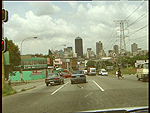
Johannesburg
İ2002: Willem Tijssen
|
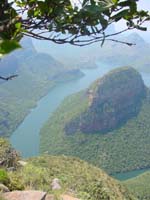
Canyon
İ2002: Schoelink/NL
|
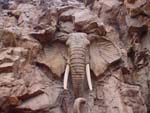
Sun City Entrance
İ2002: Schoelink/NL
|
|
Sandton/Johannesburg:
20 minutes from downtown and from the International airport, Sandton is located. This business centre attracts many
companies and business people from all around the world. Holiday Inn as well as the Intercontinental are both very
affordable hotels. Situated in the heart of Sandton Square we can recommend THE BBQ SKEWER. Make a reservation in time
or contact them by e-mail because its one of the most popular restaurants
in town. The BBQ Skewer has a wide range of beef, lamb, chicken, game and vegetarian, ready marinated and seasoned by
its neighbor "The Butcher Shop" and is a must like the Carnivore in Nairobi/Kenya. When visiting please tell the manager
we sent you. Last time we visited this excellent restaurant the BB Skewer was changed completely into Butcher Shop.
When you visit them tell them we told you to do so.
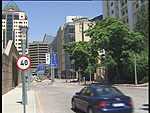
Sandton
İ2002: Willem Tijssen
|
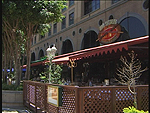
Sandton Square
İ2002: Willem Tijssen
|
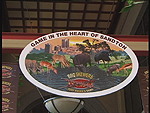
The Butcher Shop
İ2002: Willem Tijssen
|
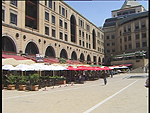
Sandton Square
İ2002: Willem Tijssen
|
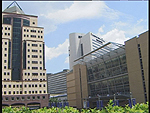
Sandton
İ2002: Willem Tijssen
|
Soweto:
Soweto is the acronym for South Western Township. It span over 2.5 square miles and is home to 4 million South African
Blacks. The government estimate of 2 millions is far below reality. The apartheid government founded the township in 1948.
It was a collection of cheap houses for black workers working in the gold mines. Blacks were not allowed to live in
Jo'burg. Soweto grew swiftly and became the product of the racist policies of the Boers. It also became a focus in
the fight for freedom and equality, a manufacture of luminaries, reformers, theoricians and revolutionaries of the
new order.
The little one-bedroom house where Nelson Mandela lived in 1960 before he went underground and where he came back upon
his release from Robben Island on February 11, 1990 is today a museum. Desmond Tutu's house is only a few blocks away
in the same street, which makes Villagrazi Road the only street in the whole world with the homes of two Nobel Prize
winners.
Pretoria:
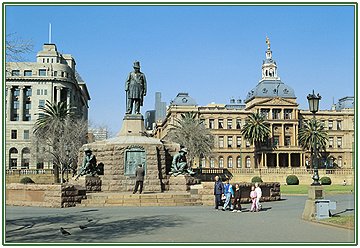
Church Square
İ2001-2002: Tourist Office
|
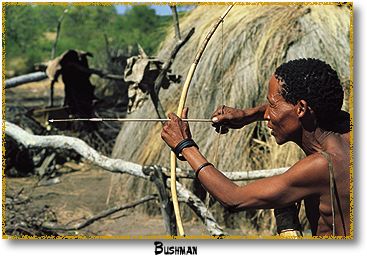
Bushman
İ2001-2002: Tourist Office
|
|
|
Pretoria is the administrative capital of South Africa. Founded in 1855, it was named after Andries Pretorius. From then
on, it became Transvaal's capital in 1860, and later on South Africa's capital in 1910. During spring, the Jaracanda
trees bloom the most beautiful purple flowers you will ever see. Originally from Australia, Jaracandas are lining the
immaculate streets of Pretoria, nicknamed Jaracanda City. The city itself has a population of around 450,000 people and
maintains a relaxed atmosphere with streets lined with jacaranda trees. Important buildings and institutions in the city
include six museums, Voortrekker Monument, statues of Paul Kruger and Lous Botha, Catholic Cathedrals, nature reserves,
National Zoological Gardens, and the universities of Pretoria and South Africa. Most people in the city work in the
service sector, while there are industries like iron and steel, engineering, food processing, and diamond mining.
|
Durban:
|
Durban is South Africa's third-largest city and is an African city in the true sense of the word, a city of contrasts.
Expensive Hotels and Guest houses grace the beachfront, while noisy vendors sell their wares on many of the streets.
Art collections adorn the walls of sophisticated galleries. There are state-of-the art Western Hospitals and traditional
African Healers, a busy central city railway station, the busiest Port in Africa and yet within 30 minutes you could be
in the deepest of rural Africa. Durban has always been a holiday city drawing visitors from all over the world, because
of its subtropical climate there are warm seas and safe swimming beaches as well as it's cultural diversity, richness
and vibrancy enjoyed by few other South African cities.
|
|
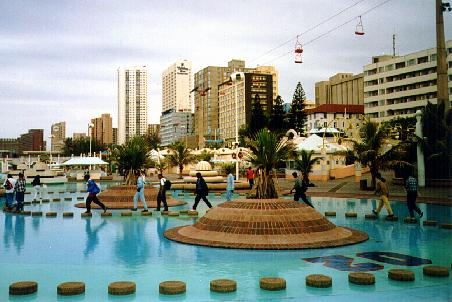
Durban
İ2001: Bernard Cloutier
|
|
KwaZulu Natal:
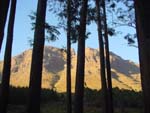
Sceneray
İ2001-2002: Schoelink/NL
|
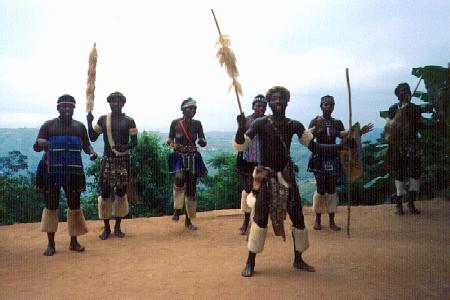
Zulu Dancers
İ2001: Bernard Cloutier
|
|
|
KwaZulu Natal is a destination that continues to intrigue, challenge and excite both visitors and locals aline,
because no matter how much time you spend here, there will is always so much more to see and experience. KwaZulu
Natal or eZulweni which is the Zulu name which means 'heaven', an apt name for a province which is well known for
its glorious subtropical climate, the Country's finest game reserves, beautiful mountain ranges and wonderful beaches.
RICHARD'S BAY is a busy port some 70 miles north of Durban and presents a choice of shore visits that explore two
contrasting aspects of KwaZulu-Natal's exciting wildlife heritage. The coastal St. Lucia Game Reserve is a fascinating
wetland reserve with some of the world's highest forested dunes - and game that includes black rhino and South Africa's
largest hippo and crocodile populations, as well as flamingo and other exotic birdlife. Inland extends the huge Hluhluwe
Game Reserve which supports Africa's greatest concentration of white and black rhino - as well as lion, elephant,
leopard and other species.
|
East London:
|
On one the loveliest stretches of the Eastern Capes magnificent Indian Ocean coastline, East London is South Africas
only river port city, set beside the broad Buffalo River. Its an attractive and young-at-heart place that preserves
architectural and other intriguing reminders of its past British connections (try the shopping in Oxford Street!). The
beautiful beaches, the pubs, shops and restaurants of the Latimers Landing waterfront, and the exhilarating scenery of
the spectacular and unspoilt Wild Coast to the north will all compete for your time.
|
|
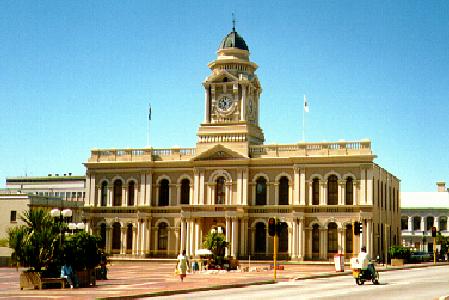
Port Elizabeth
İ2002: Bernard Cloutier
|
|
|



